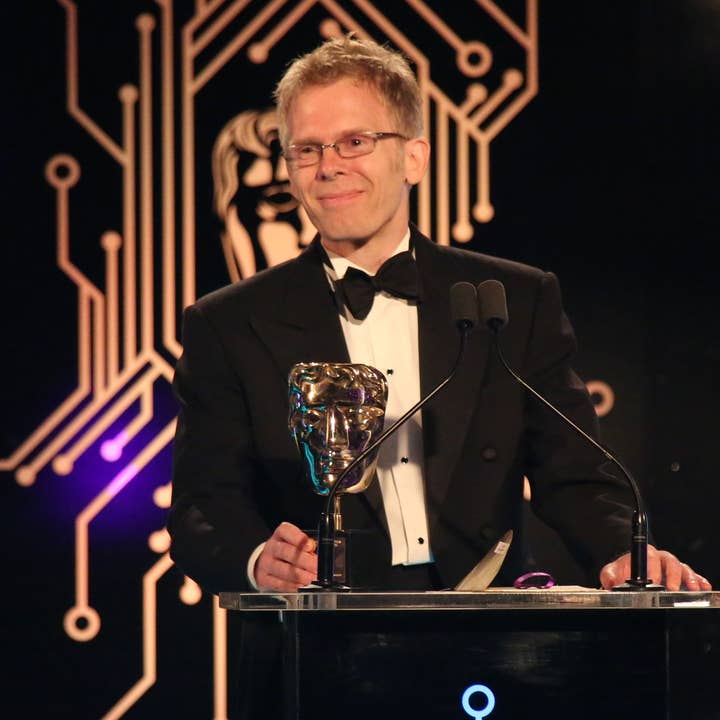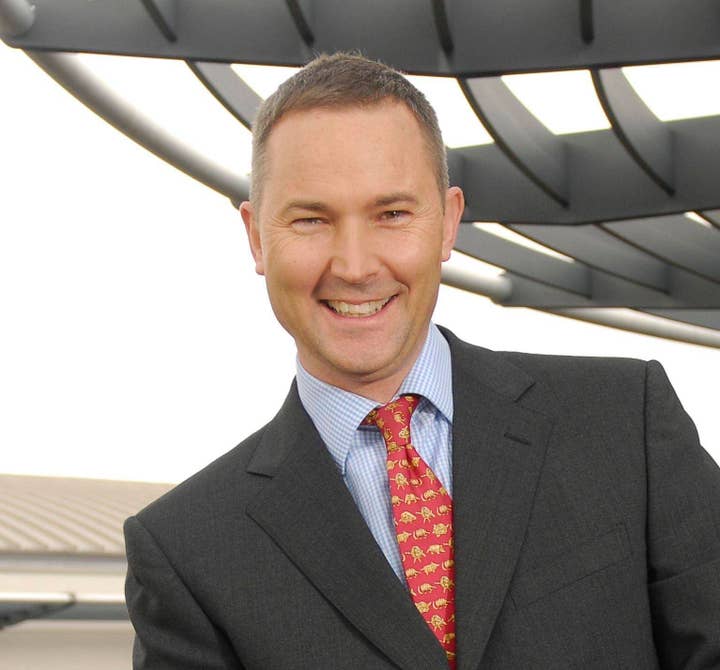“We want games to be as important to us as film and TV” - BAFTA
Arts charity details global ambitions as David Gardner steps in as VP
The British Academy for Film and Television Arts is not an especially good name for an organisation that wants to be recognised globally for its work in games.
The UK charity that's best known for its awards has been called BAFTA since 1976 - a time before Space Invaders and Pac-man and Super Mario. In fact, it had supported the worlds of movies and TV for over 50 years before it added video games into its structure.
As a result, it's easy to almost ignore BAFTA in this industry. Its video game awards are highly respected - perhaps more so than any other - and the lectures and classes it has put together are well attended and informative. It has done a decent job for games. Yet as an organisation built around TV and film, you can perhaps understand why it hasn't become synonymous with games, at least not yet.
However, things are improving. BAFTA is attracting bigger names, it awarded Uncharted creator Amy Hennig with a special award at E3 last year and is eyeing up expansion into new countries.
And now it has hired its first video games VP in the form of ex-Atari and EA chief David Gardner.
Emma Baehr, BAFTA's VP of events and membership, tells us that this all represents its "renewed commitment to video games" and that it wants to establish the "most influential group of games craft people".
"For me, supporting and identifying the next generation of talent is essential," she says. "In order to do that, we need to grow our profile.
"In recent years we've been trying to get a broader, more inclusive and engaged membership. And it is important to get that games membership increased, with the right people who are reflective of the fact that we are an international organisation."

The introduction of David Gardner will undoubtedly help with that, although cynics might observe that film and TV have had their own VPs for a while now. Indeed, it's little things like that which creates the impression that video games just don't have the same weight of importance as the other screen industries within BAFTA.
"We didn't always have VPs to represent each art form," Baehr defends. "Originally we had Richard Attenborough as our president and just the one VP, so it is only in recent years where we have had film and television VPs. Obviously games as an art form within BAFTA is roughly ten years old, whereas film has been there since the 1940s and TV followed ten to fifteen years afterwards. But now to renew our commitment to games, it felt like the right time to introduce a games VP and we have found the right one in David."
"Over the years has games been as important at BAFTA? No. There are fewer games members. So the industry needs to step up as well.
David Gardner, BAFTA
Gardner adds: "Are games lesser? My whole career we have been asking that question. This is not just a BAFTA issue, it is a games industry issue. It feels like we're always asking to be as relevant to society as movies and television.
"I remember when we passed the first threshold and games started to get billion-dollar franchises. Titanic was a billion-dollar franchise and then with FIFA, Call of Duty, Battlefield and Madden in the US, suddenly we were having billion-dollar franchises. You can see the trajectory of games and the fantastic growth over 25 years. Just look at how much time people are spending on games - whether that is console or mobile. Or the number of games franchises that are becoming films, albeit not always successfully.
"BAFTA is definitely on track for gaming. The strategic review is that we want games to be equally as important. But we have to get there. We need all the right resources in place - which is why they've asked me to step up.
"Over the years has games been as important at BAFTA? No. There are fewer games members. So the industry needs to step up as well. It's not just a BAFTA issue and I am very happy to try and spearhead this."
Part of the vision for BAFTA is to have a more global presence - again, despite the unhelpful word 'British' in its moniker. It has already issued an award in the US, BAFTA has offices in Los Angeles and New York, and now it's looking to expand to Canada, China and Scandinavia.
"Although we are the British Academy, we have always had an international outlook, even from our first awards in 1949," Baehr says. "But we do it with a British perspective. The awards ceremonies are a shop window, we shine the spotlight on our British nominees and we have a dedicated category for them. But we've always had a global outlook.
"The main thing is that we need to reflect the industry and be where that industry is. The business world is very global, so it is just logical that we would do this."
Gardner continues: "Exactly. Scandinavia lines up with where the most influential games are originating from. In Scandinavia we have had so many major hits from studios like DICE, Pardox, Rovio, Supercell... there is just an incredible amount of talent. They are very much advancing the art.
"Canada, as well, with all the game production that has been built up over the years there.
"Asia continues to be massively important. I think China, in some ways, is the most international of the Asian markets. Japan is a very big market, but it has its own domestic ecosystem, and it just seems like China - now that it is economically a larger market - is also more open to importing products from around the world. It just seems more relevant."
"We want our games awards to be the most prestigious and well known awards event for the entire industry.
Emma Baehr, BAFTA
The awards may be the biggest opportunity for BAFTA on the global stage. The BAFTAs for TV and film are unquestionably successful, but they play second fiddle to their big US rivals - namely The Emmys and The Oscars. Yet in games the BAFTAs are quite unique. It's legacy in TV and film give it a history that The Game Awards in the US simply doesn't have.
"We want our games awards to be the most prestigious and well known awards event for the entire industry," Baehr agrees.
David Gardner should certainly help BAFTA's global ambitions. He was amongst EA's first employees and eventually led all of its studios around the world. He was CEO of Atari and now works with various businesses in multiple countries. He's London-based but with a plethora of experience working with and in other territories. He sounds like the ideal fit.
Yet more recently he's been more involved with the investment side of the industry as one of the founders at London Venture Partners - a VC fund known for backing the likes of Supercell and Unity. This recent experience on the financial side seems at odds with BAFTA's remit to help creators improve their skills, but Gardner disagrees.
"I believe it is relevant," he says. "I realised a few years ago that we want the industry to be global, and during the peak of the console dominance, there were very few publishers in Europe - really there was only Ubisoft. Systematically, companies either closed or were acquired. So what I realised is that having de-centralised financing was critical to the local creative community. I could say that for London, but it will be true globally for all the members.
"So what we want are creatives that are great at building games, but we also want strong finance capabilities. A team has to be good at raising money - whether that is from venture capital, or publishers or crowd-funding. And BAFTA plays a role in creating a forum for people to learn about it and debate it. So it is increasingly relevant. It is not dominant, but it is still important."

Part of BAFTA's plan is to run more events to support creatives, and with a global remit, that will include streaming and promoting their presentations via video platforms. There will be an increased number of events that combine the worlds of TV, movies and games.
"We are doing a lot more cross-sector collaboration events," Baehr says. "We always have our screen lecture series, and we did that recently with David S Goyer [Dark Knight, Call of Duty], who has written for film, TV and games. We also have our BAFTA Game Gurus, and we have a mini-festival called BAFTA Guru live, which is about inspiring creatives. This year it will be cross-sector and making sure we are moving those screen industries closer together.
"In the US, we will have a presence at E3, we were at GDC, and we are making sure there are regular masterclasses, panel discussions and activity that we are constantly pushing out to our members."
Gardner adds: "The cross-sector stuff is what excites me. Being able to bring movies, television and gaming together, and BAFTA is uniquely positioned because there is no other organisation like it. The Oscars just focus on films. Nobody has the ability to cross-pollinate like we do.
"There will be no questions asked about whether games are tremendous important. BAFTA will be synonymous with games
David Gardner, BAFTA
"The age of the artist, the tools that are being used, the consumer demographics... everything is moving towards this thing that we've been talking about so long, of things crossing sectors. IP might not move simultaneously across these different mediums, but clearly the artists are moving across and franchises are moving across. It is amazing that BAFTA seems to stand alone with this, and so we really want to capitalise on that."
Gardner's new job isn't for life. BAFTA VPs are not permanent and can only serve up to a maximum of six years. So once 2023 rolls around, what will he consider as being a successful tenure?
"Probably three things," he concludes.
"The first is that BAFTA will be clearly positioned. There will be no questions asked about whether games are tremendously important. BAFTA will be synonymous with games.
"We will have internationalised and globalised our members. We will have far more members from far more places around the world, particularly around the countries we've spoken about.
"And finally that the classes, the events, and the others things that BAFTA puts on will be world class.
"Hopefully all of this will have positive forward momentum so that whoever is the next vice president can continue with the course that we are on."
